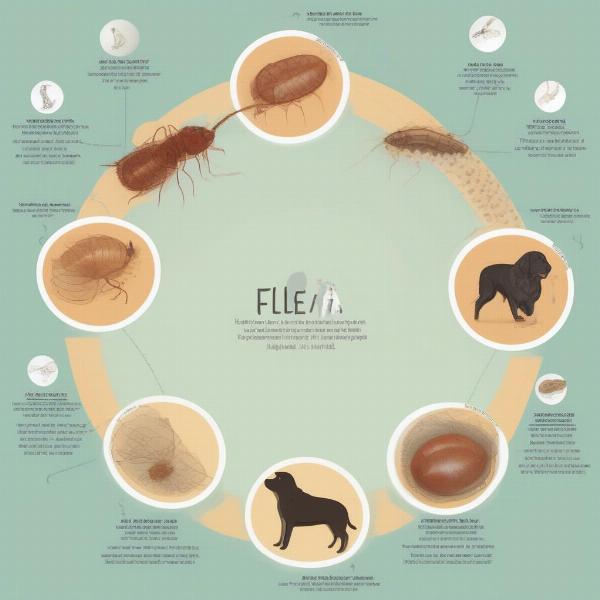Finding the best flea treatment for your dog can feel overwhelming. With so many options available, from topical treatments to oral medications and collars, it’s crucial to choose a product that is both effective and safe for your furry friend. This guide will provide you with everything you need to know to select the best flea treatment, ensuring your dog stays happy, healthy, and itch-free.
Understanding Flea Infestations in Dogs
Fleas are tiny, wingless parasites that feed on the blood of mammals and birds. They can cause intense itching and discomfort for your dog, leading to excessive scratching, hair loss, and even skin infections. In some cases, fleas can also transmit diseases. A severe flea infestation can even lead to anemia, especially in puppies. Understanding the flea life cycle is key to effective treatment. Adult fleas lay eggs on your dog, which then fall off into the environment, such as your carpet, furniture, and yard. These eggs hatch into larvae, which then develop into pupae and eventually adult fleas, starting the cycle anew.
 Flea Life Cycle on a Dog
Flea Life Cycle on a Dog
Choosing the Best Flea Treatment for Your Dog
There’s no single “best” flea treatment for all dogs. The ideal choice depends on your dog’s age, breed, size, health, lifestyle, and the severity of the infestation. Common types of flea treatments include:
- Topical Treatments: These are applied directly to your dog’s skin, usually on the back of the neck. They typically kill adult fleas and may also prevent future infestations.
- Oral Medications: These are pills or chewable tablets that kill fleas quickly and effectively. Some oral medications also protect against other parasites, like heartworms.
- Flea Collars: These collars release insecticide that kills and repels fleas. Some collars also offer protection against ticks.
- Natural Remedies: While some natural remedies may offer some repellent properties, they are often not as effective as conventional treatments. Always consult your veterinarian before using natural remedies.
Key Factors to Consider When Choosing a Flea Treatment
When choosing a flea treatment, consider the following:
- Your Dog’s Age and Health: Puppies and senior dogs, as well as dogs with certain medical conditions, may require specialized flea treatments.
- Severity of Infestation: For severe infestations, a fast-acting oral medication may be the best option.
- Lifestyle: If your dog swims frequently, a waterproof topical treatment or oral medication may be more suitable.
- Cost: Flea treatments vary in price, so choose one that fits your budget.
How to Apply Flea Treatment Correctly
Always follow the manufacturer’s instructions carefully when applying flea treatment. For topical treatments, part your dog’s fur at the base of the neck and apply the entire contents of the applicator directly to the skin. Do not bathe your dog for a few days after application. For oral medications, administer the pill or chewable tablet as directed.
Preventing Future Flea Infestations
Treating your dog is only half the battle. To prevent future infestations, you also need to treat your home and yard. Wash all bedding, blankets, and soft furnishings in hot water. Vacuum carpets, rugs, and furniture thoroughly. Consider using a flea spray or fogger in your home. In your yard, keep grass short and remove any debris where fleas can breed.
Conclusion
Choosing the best flea treatment for your dog requires careful consideration of several factors. By understanding the different types of treatments available and the key factors to consider, you can make an informed decision that will protect your furry friend from these pesky parasites. Regular flea prevention is essential for maintaining your dog’s health and happiness.
FAQ
- How often should I treat my dog for fleas? Most flea treatments need to be applied monthly.
- Can I use cat flea treatment on my dog? No, never use cat flea treatment on a dog, as it can be toxic.
- What are the signs of a flea allergy in dogs? Excessive scratching, hair loss, redness, and scabbing are common signs.
- Are there any home remedies for fleas? While some home remedies may offer temporary relief, they are generally not as effective as conventional treatments.
- Can fleas transmit diseases to humans? Yes, fleas can transmit diseases like tapeworms and plague to humans.
- How can I tell if my dog has fleas? Look for small, dark brown insects crawling on your dog’s fur, or flea dirt (small black specks) on their skin.
- What should I do if my dog has a severe flea infestation? Consult your veterinarian immediately for appropriate treatment.
Related Articles:
best dog wormer and flea treatment in one tablet
best flea tick treatment for dogs
best flea stuff for dogs
best flea and worm treatment for dogs
About ILM Dog:
ILM Dog is your trusted international resource for all things dog-related. We offer expert advice on dog breeds, health, training, nutrition, grooming, and much more. Whether you’re a seasoned dog owner or just starting your journey with a furry companion, ILM Dog provides practical, reliable information to help you provide the best possible care for your beloved pet. Contact us at [email protected] or +44 20-3965-8624 for personalized guidance and support.